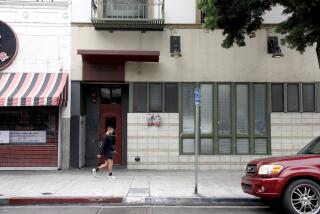Beverly Hills S&L; Assailed on Accounting Methods
- Share via
The Federal Home Loan Bank Board has issued a report criticizing the accounting methods of Beverly Hills Savings & Loan Assn. and saying that the financial institution concealed its true losses in 1982 and 1983 by recording real estate investments valued at $190 million as loans.
The bank board’s report also reminded outside auditors of their duty to issue financial reports in accordance with generally accepted accounting principles for publicly traded savings and loan companies.
“Independent professionals must report to management and stockholders . . . in a manner that is consistent with the intent, as well as the letter, of the bank board’s rules, regulations and policy statements,” the report said.
The report further reflects the bank board’s continuing efforts to clarify and toughen the accounting standards of the S&L; industry. The bank board is the principal regulatory agency for the nation’s 3,200 federally insured S&Ls.;
The report is also one more in a series of recent disclosures about the continuing problems at Beverly Hills Savings, which was placed in receivership by federal savings and loan regulators 18 months ago.
Although Beverly Hills Savings has been kept open under regulatory supervision, it had a negative net worth of more than $500 million at the end of 1985, according to its latest audited financial statement. Net worth measures assets minus liabilities.
According to the bank board’s report, Beverly Hills Savings changed its accounting procedures in 1983 after management realized that future losses on apartment properties would lead to trouble with savings and loan regulators.
The investments were part of an acquisition program in partnership with J. D. Stout Co., a California real estate developer, that acquired apartment buildings across the country. Beverly Hills Savings would eventually invest $190 million in these apartments, the report said.
To effect the beneficial accounting change, the partnership bought Beverly Hills Savings’ 60% interest in the properties, using money borrowed from BH Mortgage, the bank board said. BH Mortgage was a subsidiary of Beverly Hills Savings.
Changing the legal and accounting status to loans from investments allowed the S&L; to avoid operating losses on the apartments and to report earnings from interest and fee income on the loans, the bank board’s report said.
But the bank board said “the change in the legal form of the apartment program did not change the (economic) substance of the transactions, and therefore, the change in accounting treatment was inappropriate.” The report noted that the accounting changes were made with the approval of its outside auditor, which the report did not identify.
Beverly Hills Savings’ financial results in 1983, when it lost $7.43 million, were certified by the accounting firm of Touche Ross & Co. Officials at Touche Ross could not be reached for comment.
More to Read
Inside the business of entertainment
The Wide Shot brings you news, analysis and insights on everything from streaming wars to production — and what it all means for the future.
You may occasionally receive promotional content from the Los Angeles Times.










